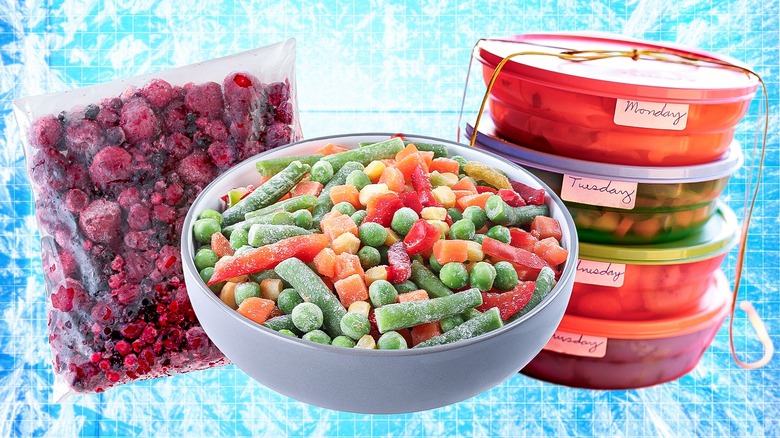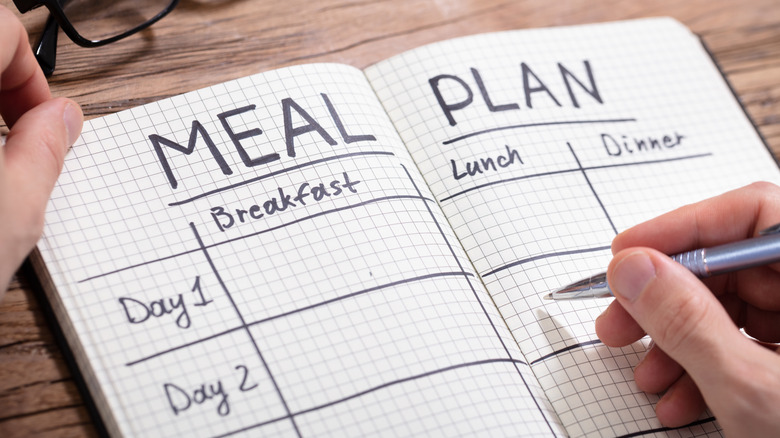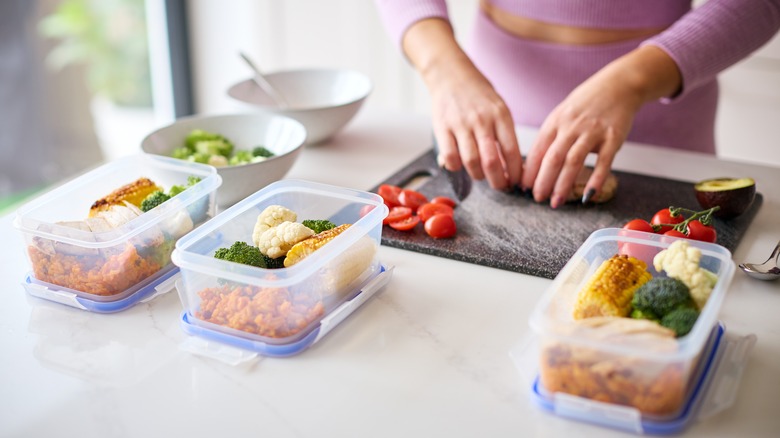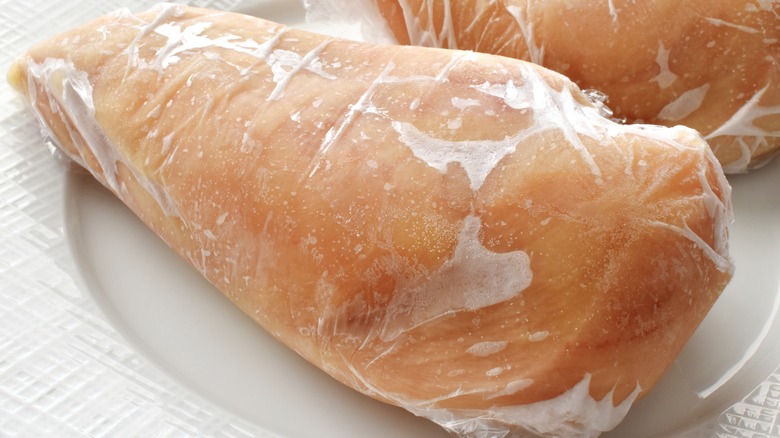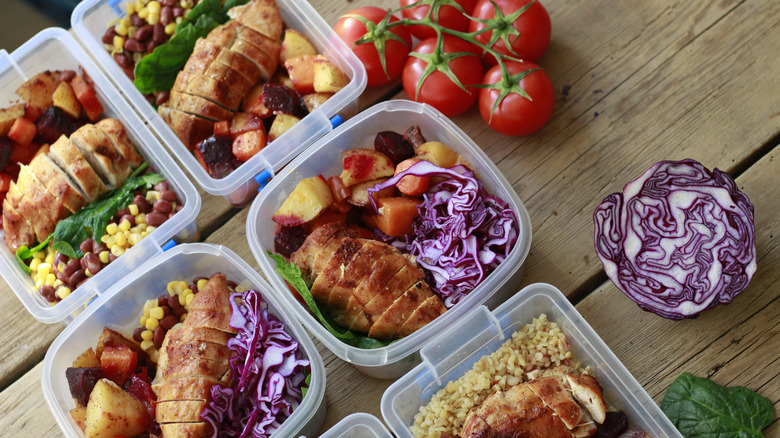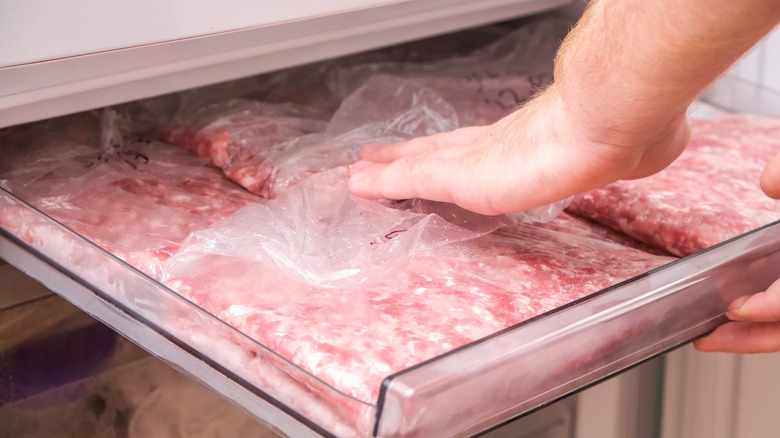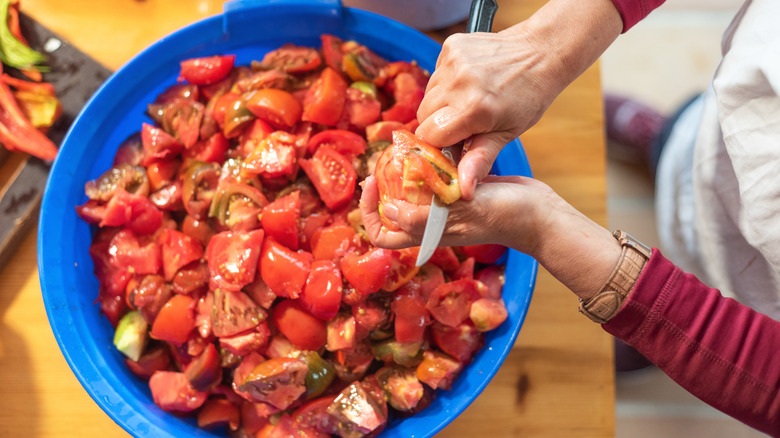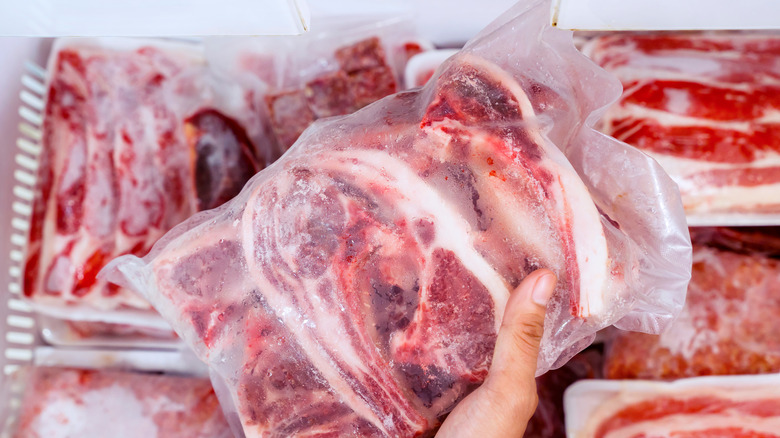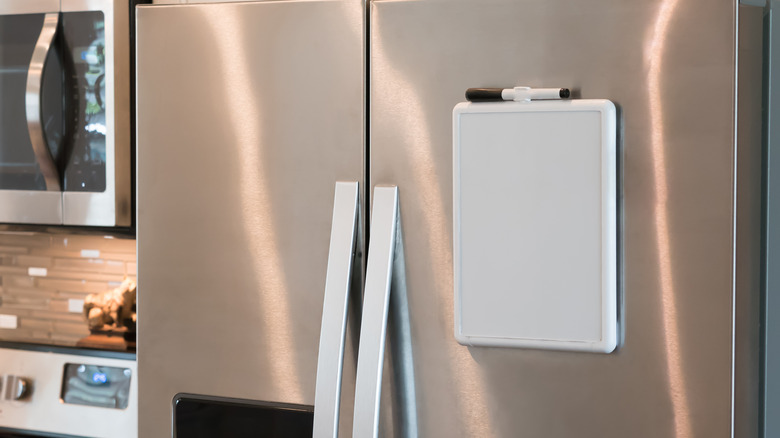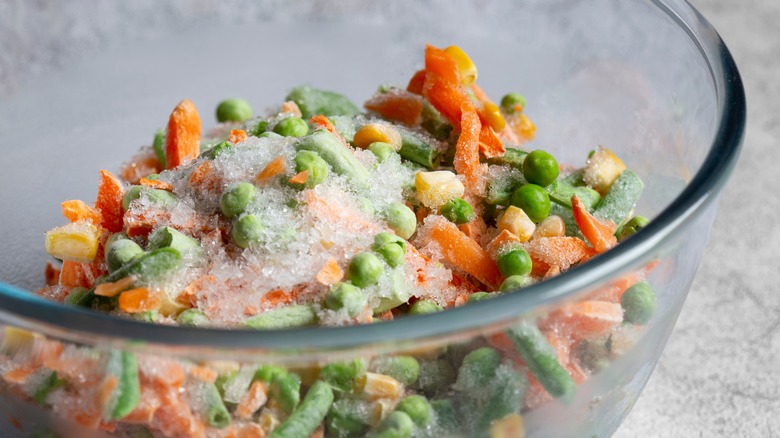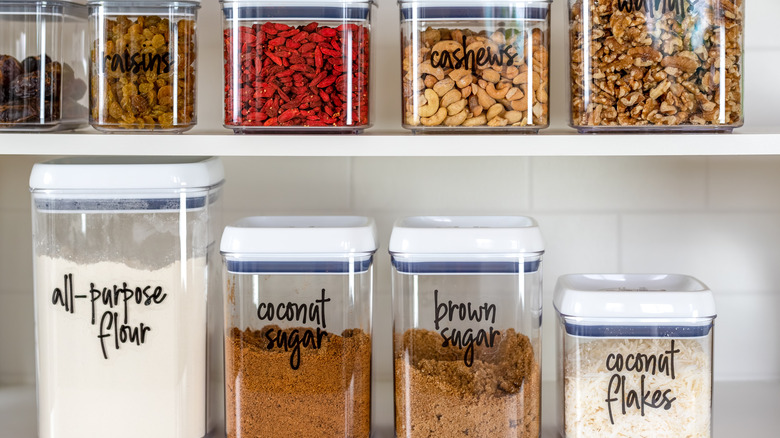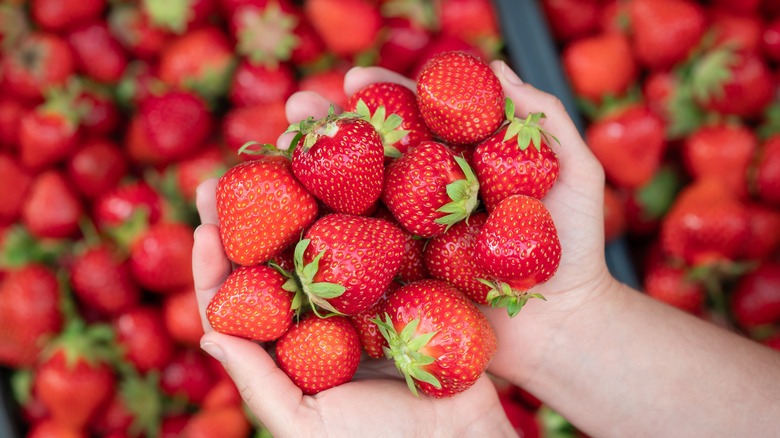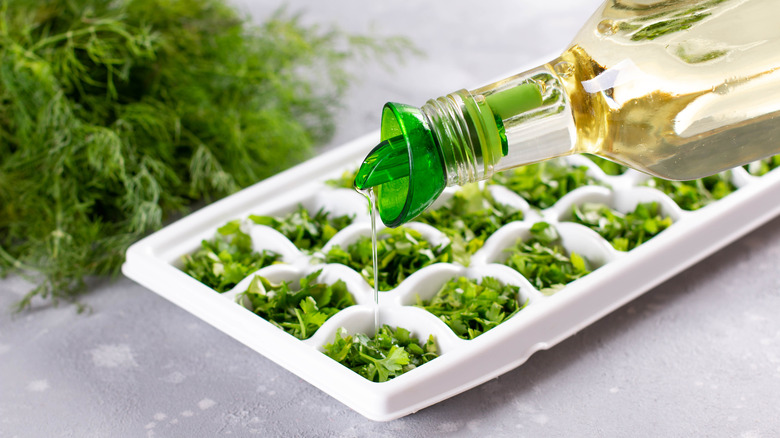Freezer Hacks To Save You Money And Effort
Preparing healthy, home-cooked meals every night of the week is what many of us aspire to, but having the time and energy to do so is not always easy. Using your freezer to help you out is a great option. It can save you time, money, and effort when it comes to preparing your weekly meals. However, sorting out your freezer and using it to its full potential can seem like an overwhelming task.
To help you in your quest to use your freezer to save money and effort, I asked two experts to share their advice: Lisa Bryan, meal prep expert, food content creator and author of bestselling meal prep book at Downshiftology; and Kelly Jaggers, food stylist, founder of recipe blog Evil Shenanigans and author of The Ultimate Meal Planning for One Cookbook. They both have years of experience in meal prepping and using their freezers effectively, and they have shared some handy tips to help you do the same.
Whether you are looking to make family meals on a tight budget, or simply want to get yourself organized for the weeks ahead, these hacks will make your kitchen life easier. Let's dive in and find out how to make the best use of your new favorite appliance.
Plan meals in advance to save time and money
Sitting down at the weekend to plan meals for every day may seem like an unnecessary step, using up time you are already short on. However, meal planning can be a game changer, allowing you to use your freezer wisely, save you money, and reduce food waste at the same time.
"Meal planning helps people buy just what they will be eating for a week of meals, so there is less food thrown away," says Kelly Jaggers. "You are also able to shop grocery store sales and manufacturer coupons, so you can plan your week around what is more affordable."
It will also make your trips to the grocery store more efficient and hassle-free. Turning up to do your shopping with no idea of what you need for the week is a dangerous game, and can turn into an expensive one too. "Meal planning also helps you to reduce food waste by not buying ingredients without a purpose, and it doesn't leave you with an empty fridge, prompting a last-minute desire to order UberEats," points out Lisa Bryan.
If possible, get yourself into a routine by planning your meals on the same day every week. Check the fridge to see if there is any produce close to going bad, and incorporate that early in the week. You can then head off to the store knowing that you will only be buying exactly what you need for the week ahead.
Organize your freezer properly
Like everything else in your home, your freezer will work best for you if it's well organized and you know exactly what is in it, though that is easier said than done. We are all familiar with the situation where you extract a frozen ball from a freezer drawer and stare at it, wondering what it could possibly have been in its unfrozen state. Good freezer habits will prevent this happening, saving you time as well as money.
"It's really important to go through your freezer on a regular basis so that you know what's in there and make sure any meal-packed food is properly labeled," says Lisa Bryan. "Most frozen foods will stay good for at least three months, so I always recommend bringing older items to the front to ensure they're enjoyed in a timely manner."
If your freezer has been lacking a little TLC, it's best to take everything out and start from scratch. Arm yourself with a Sharpie or some labels, and get ready for your freezer to look Pinterest-worthy. Knowing where everything is will make meal planning easier and prevent frozen food from dropping in quality.
Of course, once you have organized your frozen food, it is important to try and keep it that way. "Once a quarter do a tidy up and review what is in the freezer so things stay organized!" suggests Kelly Jaggers. You will find that an organized freezer makes cooking an easier experience.
Defrost food safely overnight
A key part of planning your meals in advance and using your freezer effectively is making sure that the food is defrosted and ready for cooking when you need it. To do this as safely as possible, bringing the food out of the freezer well in advance is crucial.
"Always defrost frozen items in the fridge the day before so that they can thaw overnight before reheating," advises Lisa Bryan. "Thawing your food at a cool temperature in the fridge (rather than on your countertop) also helps to keep your food safe from bacteria."
Meat poses the most risks in terms of bacteria, so it is important to defrost slowly when you can. However, if you forget to bring it out early, Kelly Jaggers suggests the next best option. "If time is short, use cold running water to defrost meat and seafood quickly," she says. "Never defrost meat and seafood on the counter, or under warm water. That can cause bad bacteria to grow and spoil your food."
Although other items pose fewer risks, it is still best to store them in the fridge as they defrost to keep them as fresh as possible and prevent microorganisms from growing. "Items like loaves of sliced bread can be defrosted in the refrigerator, and stored there after defrosting to prevent mold," Jaggers explains. "Baked rolls and croissants can be tossed into a 350 F oven for 5-10 minutes to warm up — they taste fresh-baked!"
Freeze meals and leftovers in portions
Imagine opening your freezer and having an array of beautifully prepared, healthy meals and ingredients to choose from, all packaged in perfect portions, ready to cook for dinner. Taking some time to portion out ingredients in advance prevents you from having to defrost more than you need, as this can lead to food waste.
"Freeze meat items individually, and portion ground meats into smaller portions — say 8 ounce packs — before freezing so you can pull out just what you need," Kelly Jaggers recommends. Having pre-portioned meat makes it easy to add to various dishes throughout the week, and means you have a quick option if your planned meals have to change.
"It's really easy to freeze shredded or diced individual proteins and then add them to salads or soups throughout the week," says Lisa Bryan. "The liquids and moisture from salad dressings, soups, and sauces helps to reinvigorate the thawed protein and add flavor to the dish, so it's as good as new!"
Evening meals are not the only way to use frozen leftovers. By storing them properly, packed lunches can become quick and easy too. "I like to portion leftovers so I can pull out just what I need," says Jaggers. "So, if I have extra meat loaf I will slice it and freeze 2-4 slices per pack so I can pull them out for sandwiches or lunches on the go."
Use freezer space as efficiently as possible
To maximize the money you can save using your freezer, you need to be able to store as much food as possible, meaning efficient storage is crucial. Irregularly shaped items are the enemy of efficiency, so thinking about the container you use is important before you add the food to the freezer.
Rather than storing liquids in large tubs with empty space being wasted, thinking creatively can reduce the space they take up considerably. "Items like soup can be chilled, then frozen in resealable bags on a flat tray, then stacked to make storage more efficient, and to make them easier to find," suggests Kelly Jaggers.
You can also freeze items such as meatballs individually at first, before storing together in bags after they have frozen. This means they can easily be separated when you just want a few at a time, rather than trying to pry them apart with a knife once they have frozen into a solid ball.
Jaggers also recommends keeping similar foods together in the same section of the freezer, making it easier to find what you're looking for. "For example, store frozen meats in one bin, frozen breads and waffles in a separate bin," she recommends. "It helps me to label them so my family and I can keep track of what goes where."
Double up on recipes
While cooking and preparing more food than you need may seem counterintuitive when trying to save money and time, it can help with both in the long run if you plan it correctly. It is often just as easy to prepare twice as much soup, stew, or casserole, meaning you will have another meal prepared in the freezer for an evening when you are short on time.
"Remember that you can often double recipes for very little extra work. If roasting a chicken to enjoy for the week, roast two of them at the same time instead!" suggests Lisa Bryan. "Enjoy one for dinner and then shred and freeze the other for future meals. The same can be done with a simple lentil soup — double the recipe and freeze half of it for an easily reheatable meal in the future. It also helps prevent dirty dishes (which I'm a big fan of) when you can make double the amount of food at one time."
It's also a great tactic if there is a special deal on large packs of food, which you can cook in batches, then freeze for convenience. "Freezing is a great way to preserve extra food when meal planning," says Kelly Jaggers. "Say, for example, a family pack of chicken breasts is on sale. If you utilize your freezer to preserve extra portions of chicken you can take advantage of the sale, and have chicken ready to go for a future meal plan."
Wrap food properly before freezing to retain nutrients
Freezing food is a great way to lock nutrients in, as long as you store it correctly. Storing it without proper wrapping or for too long can cause the quality to deteriorate, as Kelly Jaggers explains.
"It is important to remember that freezing will prolong the life of food but it is not an indefinite solution," she points out. "Some enzymes and microbes are still active even at temperatures below freezing, so meats, seafoods, and some fruits and vegetables will start to break down/spoil over time. Please follow freezing time recommendations to ensure your frozen foods remain fresh!"
Protecting food from the extreme temperatures is critical in keeping the nutrients locked in for as long as possible. Glass or plastic tubs or freezer-proof bags are the best way to keep your food at its best. Not wrapping your food properly can lead to freezer burn, where the water from the food crystallizes on the surface, causing texture issues and color changes. There is no point in using your freezer to extend the life of your food, only to have to throw it away because the quality has declined.
"Be sure to prepare and freeze extra portions right away so they do not spoil," says Jaggers. "Wrapping in freezer paper or plastic wrap, then placing in a resealable bag and freezing will help extend their shelf life. If you have a vacuum sealer, use that!"
Keep a freezer inventory
As part of your freezer organization, keeping an inventory will help you to stay in control of the food that is going in and out. There is no point buying fresh food at the grocery store if you already have the same thing in the freezer, so to save money, knowing what you have is key.
"Take time once every few months to reorganize and check your inventory," advises Kelly Jaggers. "An organized freezer is one you will actually cook from. Plan to use the foods you freeze or buy frozen, and make sure to label the foods you freeze with the name, purchase date or cook date, and weight/volume."
It may seem like too much added effort to label and catalog everything in your freezer, but once you have done it the first time, keeping things up to date is pretty easy. Get the whole family into the habit of making a note when they take anything out, and keep the list nearby to make the whole process easy. The time and effort will be worth it to be able to provide healthy meals for your family with little added work.
"It's hard to dispute the convenience, time-savings, and cost-savings of having a high-quality, home-cooked meal at your fingertips," says Lisa Bryan. "Especially when it prevents you from making impulsive poor food choices. So it's all about keeping things in perspective!"
Use veg straight from frozen
While meat and fish need a lot of care when defrosting to prevent dangerous bacteria from building up, vegetables can actually be cooked straight from frozen, retaining their vibrant color and flavor. "It is usually best not to defrost frozen vegetables," says Kelly Jaggers. "Just cook them from frozen. Frozen fruit can be enjoyed in smoothies from frozen. If using frozen fruit in a pie or other baked recipe it is best to defrost in the fridge for a few hours and discard any liquid to keep your recipe from being too watery."
Buying frozen fruit and vegetables isn't just a cheaper option, it is actually a great choice nutritionally too. Since it is often frozen within a few hours of being picked, the nutrients are locked in, compared to fresh food that spends time in transportation and on grocery shelves before making its way to your fridge.
Frozen fruit and veg is an economical and healthy way to incorporate a variety of nutrients into your diet, and the fact that you can use them straight from the freezer, without needing to peel or chop them, makes them even more appealing. Food wastage should be reduced as well, since you can just use the small amount you need for each meal, and the rest of the bag can stay in the freezer rather than going off in the fridge.
Pantry staples can be frozen to extend shelf life
When we think of using our freezer to prevent food from going off, we tend to think of meat, fish, and vegetables, but there are many more ingredients than can be successfully frozen. In fact, virtually any food can technically be frozen, with the exception of whole eggs in their shell. Some foods, of course, lose their quality and texture in the freezer, but many pantry staples can be successfully frozen, as Kelly Jaggers explains.
"Flour, chocolate, butter, nuts, seeds, and oatmeal are all great items to freeze if you do not use them often," she said. "Freezing will extend their shelf life, and will prevent pests, too!
The fats that make nuts so nutritious and good for your heart are prone to turning rancid the longer they are exposed to air. Freezing them shortly after opening the packaging is the best way to keep them as fresh as possible, lasting up to a year in their frozen state. Be sure to store them in airtight containers or freezer-proof bags to protect them from the extreme temperatures, helping to preserve their texture and flavor.
Freeze seasonal items to use later in the year
As a keen home cook you likely already know that eating seasonally is the best way to enjoy food at its peak flavor and nutrition, as well as its best value. However, sticking to buying seasonal produce doesn't mean that you can't enjoy the occasional out-of-season treat, thanks to your trusty freezer.
"By planning meals in advance, you can purchase ingredients when they're on sale, buy in bulk, and prioritize seasonal produce (and sales are often run on seasonal produce)," says Lisa Bryan. When your favorite fruits and veggies are in season, it is worth sorting out some space in your freezer, to make way for some deliciously fresh produce.
If you know you are going to be freezing seasonal fruit and veg, store it in the freezer as soon as you can after purchase, to lock in as many of the nutrients as possible. If you grow your own produce, freezing is a great way to enjoy that year-round too. After waiting all summer for your strawberries and tomatoes, you often get a glut of them, so freezing means they can stay fresh until you are ready to use them.
Don't forget to freeze your herbs
Adding fresh herbs to your food is an excellent way to create vibrant flavors and a splash of color in every dish, but let's be honest — tender herbs are not the hardiest of foods, and it doesn't take long for them to turn from a beautiful green bouquet to a brown, soggy mess at the back of the fridge. Before they get to that stage, stick them in the freezer to enjoy at a later date.
"An item often wasted unnecessarily is fresh herbs!" says Lisa Bryan. "If you buy a bundle of parsley, cilantro, chives, thyme, or other herbs and don't end up using the entire thing, you can roughly chop the leftover herbs and place them in an ice cube tray, fill it up with melted butter, then freeze. Now you've got a cube of herbed compound butter ready to be placed on mashed potatoes or a baked potato for an instant flavor boost." This genius hack not only prevents your herbs from suffering an undignified demise, but also means you have an easy way to add a burst of flavor to dishes whenever you need it.
